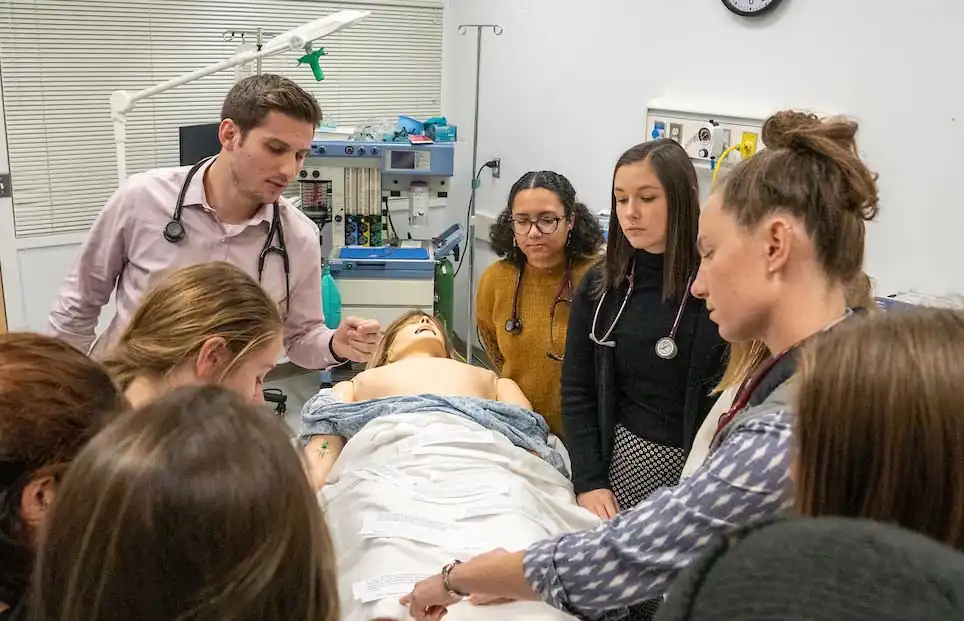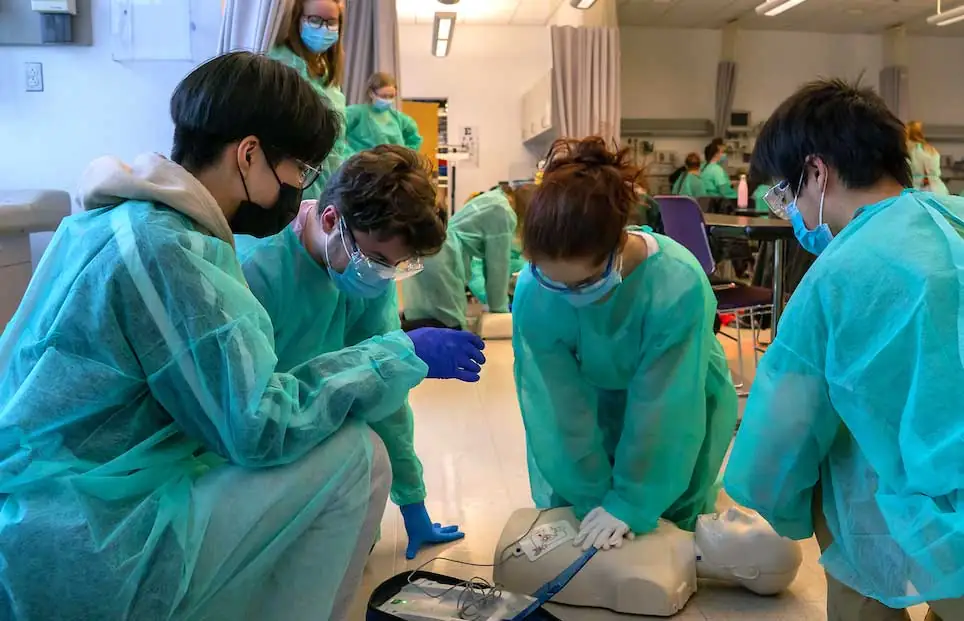
Carey Barry
MHS, PA-C, MT(ASCP), DFAAPA
Chair, Department of Medical Sciences; Associate Clinical Professor
Medical Sciences
YOU ARE BOUVÉ

Physician Assistants (PAs) are medical practitioners who practice collaboratively with a supervising physician. The PA scope of practice is authorized by state law and determined by the supervising physician.
PAs take medical histories, perform physical examinations, order diagnostic tests/studies, diagnose, develop and implement a treatment plan in consultation with the supervising physician, prescribe medication in all states, advise and educate patients on health promotion and disease management, provide inpatient hospital care for patients, and assist in surgery.


Physician Assistants provide care both in teaching institutions and in hospitals where there are no physician residents and are employed in health centers, multi-specialty medical group practices, emergency rooms, physician’s offices, and nursing homes.
As the role of the PA has expanded over the years, Northeastern has adapted its curriculum. While PA education concentrates largely on generalist medicine, more than a quarter of PAs now go into subspecialties.
Northeastern has been in the forefront of creative utilization of PAs. You will be trained as a generalist provider in the traditional primary care environment and will also be prepared to work in new and emerging aspects of health care.
Northeastern University’s PA Program prepares students for national certification and meets the education requirements for professional licensure as a Physician Assistant in all 50 states and Washington, DC, enabling graduates to apply for a PA license anywhere in the country upon graduation from the program.
Degree type:
– Physician Assistant MS
Study options:
– On ground (Boston Campus)
– Full-time only
Application deadline: Aug 1
GRE: Not required
F1: Not eligible
The 2023 US News and World Report Graduate Rankings list Northeastern University’s Physician Assistant Program as #20 in the nation.
The Accreditation Review Commission on Education for the Physician Assistant (ARC-PA) has granted Accreditation-Continued status to the Northeastern University Physician Assistant Program sponsored by Northeastern University. Accreditation-Continued is an accreditation status granted when a currently accredited program is in compliance with the ARC-PA Standards. Accreditation remains in effect until the program closes or withdraws from the accreditation process or until accreditation is withdrawn for failure to comply with the Standards. The approximate date for the next validation review of the program by the ARC-PA will be March 2025. The review date is contingent upon continued compliance with the Accreditation Standards and ARC-PA policy.
The program’s accreditation history can be viewed on the ARC-PA website at: https://www.arc-pa.org/wp-content/uploads/2021/04/Accreditation-History-Northeastern-U-11.pdf

Integrate individual, societal, community, and global determinants of health into a shared medical decision-making approach to patient care and wellness.
Exhibit interpersonal and communication skills that encourage effective exchange of information, awareness of unconscious bias, incorporation of health literacy, and cultural humility in order to promote improved medical outcomes and health equity.
Establish one’s own role and integrate knowledge of other professions in an interprofessional healthcare team that partners with the patient to advocate for and establish a patient-centered clinical approach to healthcare.
Promote the continued advancement of the Physician Assistant profession through emphasis on professional maturity and accountability, understanding of standards of care and professional integrity, and knowledge of laws and regulations that govern the delivery of healthcare.
Contribute to the greater health care system though encouragement of system-based practice, cost-effective health care and resource allocation, high quality patient care, and attention to public and population health concerns.
To transform the healthspan of our diverse society through education, innovation, leadership, and excellence.
To educate and inspire compassionate clinicians from diverse backgrounds to become accomplished leaders and innovators in all aspects of healthcare.
1 Prepare students to become effective members of an interprofessional healthcare team.
2 Graduate competent medical practitioners who are in high demand by employers.
3 The didactic education will prepare students to provide care for diverse patient populations with consideration for disability status, special healthcare needs, ethnicity, race, gender identity, religion/spirituality, sexual orientation, and social determinants of health.
4 Prepare students who demonstrate cultural humility during interactions with patients, families, and the healthcare team.
Students are expected to maintain a minimum grade point average (GPA) of at least 3.0 (“B”) in all course work. If the cumulative GPA falls below 3.0, students are placed on academic probation. Only two courses may be repeated in meeting the GPA of at least 3.0 (“B”) required for the degree. “Satisfactory” and “Unsatisfactory” grades are not included in the GPA.
Students must receive a grade of “C” or better in each individual course. If a course grade is below “C,” students are placed on academic probation even if the GPA is above 3.0.
Students must obtain a GPA of at least 3.0 (“B”) in each semester. If the GPA for any semester is below 3.0, students are placed on academic probation.
Students who receive a grade of “F” or “U” in a course may make up the course based on their advisor’s recommendation and permission of the Program Director. Students are not permitted to repeat a course more than once. As didactic courses are offered only once each year, students may have to wait at least one year to repeat a failed course or one in which they received a grade of “U.” In some cases, this could mean that students may not continue in the Program because they have not completed a prerequisite. Course credits earned in the Program are valid for a maximum of four years unless an extension is granted by the PA Program Director.
To be removed from probation, students must clear any deficient grades; maintain a 3.0 GPA in all future semesters without receiving an “I,” “F,” “U,” or “W” grade; meet the requirements listed above; and petition for removal from probationary status. Students who do not meet these requirements are subject to dismissal. Readmission to the program is at the discretion of the Program Admissions Committee.
An “I” (Incomplete) grade will be changed to a letter grade when the deficiency that led to the “I” is corrected to the satisfaction of and in the manner prescribed by the course instructor. A grade of “I” must be cleared within 30 calendar days from the date of its initial recording on a student’s permanent record. Students must sign an Incomplete Contract with the Program as required by the Registrar’s office and complete the terms specified prior to clearing the “I”.
Students are permitted to decelerate in the event of a formal leave of absence. A leave of absence is granted at the discretion of the Bouvé College Dean of Graduate Studies and is limited to one year in duration. The student must petition the Bouvé College Dean of Graduate Studies to return to the Program. The Program itself does not participate in the granting of a leave or in reinstatement. After a return from the leave of absence, the student must repeat in its entirety any course for which a final grade was not entered.
A letter grade is given for each clinical rotation (applied study). The clinical grade includes a review of the student’s clinical performance and professional conduct as determined by the preceptor at each site. A grade of at least “C” in each clinical rotation is required. If a student fails a rotation, repeating it is at the discretion of the preceptor and Program Director. A student may repeat only one rotation during the entire PA Program.
Students must have at least a 3.0 GPA to enter their second year (Semester 4). Students must maintain at least a 3.0 GPA during the clinical year or be placed on academic probation. In order to graduate, students must pass all end-of-rotation exams as well as a comprehensive exam at the completion of their second year.
Students are required to pass a Summative Evaluation within the last four months of the program prior to graduation. For more information you can review the Summative Evaluation description.
Students are also required to successfully complete a Scholarly Paper/Capstone Project of publishable quality prior to graduation. A passing grade for the Scholarly Project is 70% or higher.
Students must have at least a 3.0 GPA upon completion of the Program to receive the Master’s degree.
| Graduated Classes | |||
|---|---|---|---|
| Class of 2021 | Class of 2022 | Class of 2023 | |
| Maximum entering class size (as approved by ARC-PA) | 49 | 52 | 52 |
| Entering class size | 49 | 52 | 52 |
| Graduates | 49 | 48 | 49 |
| *Attrition rate | 0.0% | 7.7 | 5.8% |
| **Graduation rate | 100.0% | 92.3% | 94.2% |
*Attrition rate calculation: Number of students who attrited from cohort divided by the entering class size.
**Graduation rate: Number of cohort graduates divided by the entering class size.
Northeastern’s PA Program is highly integrated within each semester as well as vertically between semesters. Methods of instruction include general lectures limited to the maximum 52 students in the class, small group discussion sections of 5 to 8 students, and simulation lab exercises including interdisciplinary cases with students from other health science programs in our college.
We are committed to developing future physician assistants who can advance diversity by providing culturally informed care to people across race, gender, sexuality, ethnicity, class, age, ability, and nationality. We support the acquisition of competencies that prepare our students to recognize, confront, and end discrimination in its many forms.
Instructors are able to respond to questions and go into topics in considerable depth, preparing you for the clinical placements where you will put your knowledge to work.
Successful completion of the entire two-year program is required to take the PA National Certification Exam (PANCE).
The program is a full-time day program. There is NO part-time option.
During the first year, students will have classes Monday through Friday, generally from 8:00 a.m. to at least 5:00 p.m.
Occasionally, there may be a special evening lab or demonstration which students are made aware of well in advance.
While on rotation during the second year, students will go to various rotation sites and are expected to fulfill the hours required at different sites, including evenings, weekends, and on-call coverage.
Sample curriculum, subject to change.
The chart below describes a sequence of courses as taught in the recent past. This chart is not a planning document for what course will be taught in which semester (spring or fall) in the future. For that information, students should consult with their academic advisor or see the university course catalog.
Both academic work and patient care experience must be completed prior to applying to the program with the following exception. Applicants with outstanding degree completion and/or a single outstanding prerequisite course will be considered if successfully completed by June 15th prior to matriculation.
Admissions requirements and procedures are reviewed and revised annually. Please refer to our Selection Process and Criteria. Updates are generally made on our web page at the end of March.
We are unable to pre-review transcripts before an individual applies to the program. It is the applicant’s responsibility to review the most current information prior to applying. All applications will be considered as long as they are complete and are submitted prior to the August 1 deadline and verified by CASPA by August 31.
Both academic work and patient care experience must be completed prior to applying to the program with the following exception. Applicants with outstanding degree completion and/or a single outstanding prerequisite course will be considered if successfully completed by June 15th prior to matriculation.
Admissions requirements and procedures are reviewed and revised annually. Please refer to our Selection Process and Criteria. Updates are generally made on our web page at the end of March.
We are unable to pre-review transcripts before an individual applies to the program. It is the applicant’s responsibility to review the most current information prior to applying. All applications will be considered as long as they are complete and are submitted prior to the August 1 deadline and verified by CASPA by August 31.
We can answer general questions about the program that are not addressed on our website. You can call us at 617.373.3195 or email at [email protected].
Bachelor’s degree in any major from a regionally accredited institution.
A minimum overall GPA of 3.00 on a 4.00 scale as calculated on the CASPA application. We will accept any of the following overall GPAs to satisfy this requirement:
A minimum science GPA of 3.00 on a 4.00 scale as calculated on the CASPA application. This GPA includes all college science courses taken at regionally accredited institutions. We will accept any of the following science GPAs to satisfy this requirement:
Stronger preference will be given to applicants who demonstrate strong academic rigor including the type of coursework completed and whether difficult courses were completed one at a time versus several difficult courses taken concomitantly.
The GRE is NOT required and will not be considered in your application review.
The following academic work must be completed prior to applying by the August 1 deadline.
It is essential that applicants review the detailed Physician Assistant Program Prerequisites information below. Please be sure to review the FAQ section (below) for additional guidelines and explanations on course prerequisites. Students must earn a grade of solid B or better from a regionally accredited institution for a course to fulfill a prerequisite. Pass/Fail grades do not fulfill any of the prerequisites unless otherwise indicated (see COVID-19 prerequisite modifications).
| Course | Institution | Mode of Delivery | Timeframe | Minimum Number of Required Courses | Minimum Grade5 |
|---|---|---|---|---|---|
| Biology Lecture1 | 2-year or 4-year | in-class OR online | 10 years | 2 | B |
| Biology Lab | 2-year or 4-year | in-class OR online | 10 years | 1 | B |
| Chemistry Lecture2 | 2-year or 4-year | in-class OR online | 10 years | 2 | B |
| Chemistry Lab | 2-year or 4-year | in-class OR online | 10 years | 1 | B |
| Anatomy & Physiology | 2-year or 4-year | in-class OR online | 10 years | See footnote3 | B |
| Statistics4 | 2-year or 4-year | in-class OR online | 10 years | 1 | B |
1Any combination (basic or upper level) of 2 semesters of biology lectures plus 1 biology lab. Courses may include general biology, microbiology, genetics, immunology, infectious disease, pathophysiology, cell biology. Courses labeled “for non-science majors” are not appropriate.
2Any combination (basic or upper level) of 2 semesters of chemistry lectures plus 1 chemistry lab. Courses may include general chemistry, inorganic chemistry, organic chemistry, biochemistry. Courses labeled “for non-science majors” are not appropriate.
3Anatomy and Physiology is commonly offered as A&P 1 plus A&P 2 or 1 semester of anatomy plus 1 semester of physiology. Course content must be in sufficient depth to provide a comprehensive understanding of the body and must cover the entire body from head to toe including all body systems. Either a one semester or a two-semester course is appropriate as long as all systems are included. Human, vertebrate, and animal A&P are all acceptable. A&P lab is not required. All components of the Anatomy and Physiology sequence must have grades of solid B or better.
4Statistics may be offered by any department (biostatistics; statistics for psych, math, or business majors among others). The course content needs to include probability theory, multiple regression, hypothesis testing, T tests, chi square, ANOVAS, Z tests, correlations, means, medians, modes, and logistical regression as well as how to select and apply the appropriate statistical test, how to analyze the data, and how to interpret the results. Calculus does not satisfy the statistics prerequisite
5Grades of B- or below do not fulfill the minimum grade requirement.
The Admissions Committee defines patient care experience as working directly with patients. Examples of patient care experience include, but are not limited to:
The job title of the position is not as important as the specific duties performed. Administrative work in a healthcare setting or caring for family members will not be considered.
Patient care experience should be completed prior to applying by the August 1 deadline. Strong preference will be given to applicants who have approximately 1000 hours of patient care experience prior to applying to the program. A stronger preference will be given to those with over 1800 hours of patient care experience prior to applying. Applicants with fewer than 1000 hours may also be given consideration depending upon the strength of their entire application.
PA shadowing is not a prerequisite and does not count toward patient care hours. However, we highly recommend shadowing to acquire a solid understanding of the PA role.
Please be sure to review the FAQ section for additional guidelines and explanations.
Please note: These requirements are for applicants who are applying to the class that will matriculate in August of each year. Prerequisites are subject to change for future admissions cycles.
For applicants who have earned degrees outside of the United States, the following prerequisites must be completed prior to applying:
World Education Services
Bowling Green Station
PO Box 5087
New York, NY 10274
Phone: 212.966.6311
Website: www.wes.org
Current and ongoing patient care experience is needed in order to be a competitive applicant.
A candidate for the Physician Assistant Program must have abilities and skills in:
Observation Candidates and students must be able to observe demonstrations and participate in experiments in the basic sciences, and must observe a patient accurately at a distance and close at hand, noting both nonverbal and verbal signals. Observation necessitates the functional use of the sense of vision and other sensory modalities.
Communication Candidates and students must be able to: speak intelligibly, hear sufficiently, and observe patients closely in order to elicit and transmit information; describe changes in mood, activity, and posture; and perceive nonverbal communications; and communicate effectively and sensitively with patients. Communication includes not only speech, but also reading and writing skills. Candidates and students must be able to communicate effectively and efficiently in oral and written English with all members of the health care team. Students must demonstrate reading skills at a level sufficient to accomplish curricular requirements, provide clinical care for patients, and complete appropriate medical records, documents, and plans according to protocol in a thorough and timely manner.
Sensory and Motor Coordination and Function Candidates and students are required to possess motor skills sufficient to directly perform palpation, percussion, auscultation, and other basic diagnostic procedures; and execute motor movements reasonably required to provide basic medical care, such as airway management, placement of catheters, application of sufficient pressure to control bleeding, and simple obstetrical maneuvers. These actions require coordination of gross and fine muscular movements, equilibrium, and functional use of the senses of touch and vision.
Intellectual-Conceptual, Integrative and Quantitative Abilities These abilities include measurement, calculation, reasoning, analysis, and synthesis. Problem solving, the critical skill demanded of physician assistants, requires all these intellectual abilities. Candidates and students must be able to: independently access and interpret medical histories or files; identify significant findings from history, physical examination, and laboratory data; provide a reasoned explanation for likely diagnoses and prescribed medications and therapy; recall and retain information in an efficient and timely manner. The ability to incorporate new information from peers, teachers, and medical literature in formulating diagnoses and plans is essential. Good judgment in patient assessment and diagnostic and therapeutic planning is essential. Students must be able to communicate their knowledge to others when appropriate.
Behavioral and Social Attributes Candidates and students must possess the ability to: use their intellectual capacity, exercise good judgment, and promptly complete all responsibilities attendant to the diagnosis and care of patients under potentially stressful and/or emergency circumstances; develop empathic, sensitive, and effective relationships with patients; adapt to changing environments and learn in the face of uncertainties that are inherent in the practice of medicine; use supervision appropriately and act independently when indicated. Compassion, integrity, ethical standards, concern for others, interpersonal skills, interest, and motivation are all personal qualities that will be assessed during the admissions and educational process.
The University requires that every student submit proof of a health and immunization evaluation prior to matriculation. In addition, most institutions and clinical sites require that students provide documentation of immunization status. University Health and Counseling Services provide Immunization Clearance Forms. Students are responsible for having the Student Health Form completed and returned to Health Services prior to matriculation so that the Clinical Clearance Form can be processed and available for clinical sites. In order to complete rotations, students are required to sign a release form that allows the Program to share immunization records with clinical sites. The Bouvé College of Health Sciences immunization requirements are consistent with current Centers for Disease Control recommendations for the immunization of Health Care Providers and can be found on the Northeastern website. Students planning to matriculate are encouraged to review the information included on the New to NU web page.
The mission of the Northeastern University Physician Assistant Program is to educate and inspire compassionate clinicians from diverse backgrounds to become accomplished leaders and innovators in all aspects of healthcare. As global citizens, we are dedicated to access, equity, and inclusion. We are committed to developing future physician assistants who can advance diversity by providing culturally informed care to people across race, gender, sexuality, ethnicity, class, age, ability, and nationality.
A class of 52 students matriculates once each year in August. The CASPA application cycle opens in late April, and our application deadline is August 1 of the year prior to planned matriculation. We do not have early decision or rolling admissions. Early application submission does not guarantee early review of your application. All applications will be fully reviewed and equally considered if they are submitted to CASPA by 11:59 p.m. Eastern Time on August 1 and verified by CASPA by 11:59 p.m. Eastern Time on August 31. Applicants with outstanding degree completion and/or a single outstanding prerequisite course will be considered if successfully completed by June 15th prior to matriculation. If you are completing one final course, be sure it is listed under “Courses in Progress/Planned” on the CASPA application. It is your responsibility to send an official transcript directly to the PA Program as soon as the final grade/degree conferral is available. Electronic transcripts are preferred. The admissions process has 3 phases:
Northeastern University’s Physician Assistant Program does not award or grant advanced placement or course credit to any admitted students regardless of previous education or work experience. All applicants must meet the Program’s rigorous criteria for admissions. Admissions decisions are made without regard to race, color, religion, creed, sex, sexual orientation, gender, gender identity, genetics, nationality, veteran’s status, disability, or age. The admissions process is competitive. During the 2023-2024 application cycle, we had approximately 2,200 verified CASPA applications.
The Northeastern University Physician Assistant Program reviews applications holistically. All components of the CASPA application are considered in selecting candidates for a personal interview. No one specific application component will ensure admission to the program. The holistic review considers the following:
Approximately 200 candidates are interviewed. Interviews will be conducted virtually and are usually scheduled in mid-October. Applicants selected for personal interviews will be notified via email a few weeks prior to the date of the interview. The interview process provides applicants the opportunity to:
During the personal interview the admissions committee not only considers all components of the CASPA application but also evaluates applicants regarding:
Final selection of the class will be conducted by holistic review of the candidates who were interviewed. This selection will be based upon all components of the CASPA application review, and the personal interview.
Applicants will receive email notification regarding their status by late December. All admissions decisions are final. Those offered a seat in the program will have two weeks to respond. A deposit of $1000 is required to secure your place in the class and will be applied to your first term’s tuition.
Tuition for students beginning the program in the fall of 2023 is $18,850 per term, for a total of $56,550/year. The Double Husky Scholarship is available to students starting with the class matriculating in August 2021 in the Physician Assistant Program. Additional fees are also listed below and are subject to change annually.
| Year 1 | Year 2 | Total 2-Year Estimated Cost | |
|---|---|---|---|
| Physician Assistant Program Tuition | $56,550* ($18,850 per term) | $56,550* ($18,850 per term) | $113,100 |
| Textbook/Required Lab Materials | $350 | $350 | $700 |
| Criminal Background Checks | $82 | $82 | $164 |
| Student Center Fee | $179 | — | $175 |
| Student Recreation Fee | $186 | — | $155 |
| Student Activities Fee | $42.50 | — | $42.50 |
| Travel/Parking/Housing Fees at Clinical Rotations | — | $6000 | $6,000 |
| Two PA Program Patches | $7.50 each = $15.00 | — | $15 |
| Two Short White Jackets | $25 each = $50 | — | $50 |
| Stethoscope | $172.00 | — | $172.00 |
| Metric Tape Measure | $2.50 | — | $2.50 |
| Reflex Hammer | $2.25 | — | $2.25 |
| Pen Style ECG Calipers | $24 | — | $24 |
| Tuning Forks | $17.50 | — | $17.50 |
| Diagnostic Set | $622 | — | $622 |
| Suture Pad | $80 | — | $80 |
| Suture Kit | $20 | — | $20 |
| Goggles | $5.25 | — | $5.25 |
| TOTAL ESTIMATE TUITION, REQUIRED FEES, AND EQUIPMENT | $58,400 | $62,932 | $121,282 |
| Year 1 | Year 2 | Total 2-Year Estimated Cost | |
|---|---|---|---|
| Disposable penlights | $6.50 | — | $6.50 |
| Sphygmomanometer | $141.80 | — | $141.80 |
| Nylon Medical Bag | $34 | — | $34 |
| Insufflator Bulb | $7.50 | — | $7.50 |
| TOTAL OPTIONAL MEDICAL | $189.80 | — | $189.80 |
| Year 1 | Year 2 | Total 2-Year Estimated Cost | |
|---|---|---|---|
| International Student Fee | $375 | — | $375 |
| On-Campus Parking Fee | $2,664 | — | $2,664 |
| Student Health Insurance | $2,499 | $2,499 | $4,998 |
| University Health and Counseling Services Fee | $225 | $225 | $450 |
| TOTAL POTENTIAL ADDITIONAL FEES | $5763 | $2,824 | $8,014 |
*These fees represent current expenses. Fees are expected to increase annually. Updated amounts for the upcoming academic year will be made available as soon as they are determined. More detailed information is available at University Fees and Graduate Student Fees websites.
By law, all students in Massachusetts are required to have health insurance. If a student does not elect to take the Northeastern University student health insurance plan ($2499 for the 2023-2024 academic year), evidence of other comparable health insurance coverage must be provided. More information about the Northeastern University student health insurance plan can be found here.
Information about financial aid is available through The Office of Graduate Student Financial Services (617-373-5899). There are several types of need-based financial aid in the form of government loans as well as a Northeastern loan available only for physician assistant students.
Working while attending the program is not feasible. There are no graduate assistantships or Lifetime Learning Memberships available for PA students. Information about procedures regarding refunds of tuition and fees is available through The Office of Student Financial Services website.
Northeastern University participates in the federal government’s Yellow Ribbon Program for veterans. Information about the program (including eligibility, benefits, and how to apply) can be accessed on university’s Yellow Ribbon website.
The John D. O’Bryant African-American Institute offers a graduate fellowship to students of African origin who demonstrate high standards of leadership and have a record of community service.
Applicants with outstanding degree completion and/or a single outstanding prerequisite course will be considered if successfully completed by June 15th prior to matriculation. If you are completing one final course, be sure it is listed under “Courses in Progress/Planned” on the CASPA application. It is your responsibility to send an official transcript directly to the PA Program as soon as the final grade/degree conferral is available. Electronic transcripts are preferred.
List all “in progress” and “planned” courses on the CASPA application. As soon as final grades are available, it is your responsibility to notify the program and promptly send an official transcript directly to the program so we can update your file. Electronic transcripts are preferred. We do not have early decision or rolling admissions, so there is no advantage to submitting your application early.
If you are still taking courses in the spring and summer semesters, you might consider waiting to submit your CASPA application so that the final grades appear on your application. All applications will be considered as long as they are complete and are submitted by the August 1 deadline at 11:59 p.m. Eastern Time, verified by CASPA by August 31 at 11:59 p.m. Eastern Time, and we receive the $75 Northeastern application fee by August 1 at 11:59 p.m. Eastern Time.
We do not have a supplemental application. However, Northeastern does require a $75 Northeastern application fee in addition to the CASPA application fee. For instructions on how to submit the fee, please refer to the section entitled “Northeastern $75 Application Fee” on our web page under the “How to Apply” section.
An Anatomy and Physiology lab is not required. The Admissions Committee does not evaluate the Anatomy and Physiology prerequisite based upon course credits. Rather it is the course content that is important. Both the anatomy and physiology of the entire body from head to toe, including all body systems must be covered.
Any combination of courses that covers full-body anatomy plus full-body physiology is appropriate if as long as all systems have been included. The most common combinations are A&P 1 plus A&P 2 or an anatomy course plus a physiology course. Either a one semester or a two semester course courses is appropriate if as long as all systems have been included. All components of the Anatomy and Physiology sequence must have grades of solid B or better.
Courses taken in the summer will be accepted if they are considered equivalent courses by the school offering them and they adhere to our guidelines regarding the type and content of the course.
You need to have a minimum of 2 biology lectures plus 1 biology lab and a minimum of 2 chemistry lectures plus 1 chemistry lab all with grades of solid B or better to satisfy the biology and chemistry prerequisite. Any combination of basic and upper-level biology or chemistry courses is acceptable. For example, if you took 5 biology lecture courses and earned grades below solid B in only 2 of them, you would still have 3 biology lectures with grades of solid B or better. Any combination of biology and chemistry courses (basic and upper level) taken at a regionally accredited 2-year or 4-year institution is fine.
The Admissions Committee defines patient care experience as working directly with patients. Examples of patient care experience include, but are not limited to, taking vital signs, performing ECGs, drawing blood, changing bandages and dressings, splinting, casting, removing sutures, bathing and toileting, scribing, and mental health counseling. The job title of the position is not as important as the specific duties performed. Administrative work in a healthcare setting or caring for family members will not be considered.
Patient care experience can be obtained through paid and/or volunteer experience.
Patient care experience should be completed prior to applying by the August 1 deadline. Strong preference will be given to applicants who have approximately 1000 hours of patient care experience prior to applying to the program. Stronger preference will be given to those with over 1800 hours of patient care experience prior to applying. Applicants with fewer than 1000 hours may also be given consideration depending upon the strength of their entire application.
No. All applications will be given full consideration if they are complete and are submitted to the program by 11:59 p.m. Eastern time on August 1, verified by CASPA by 11:59 p.m. Eastern time on August 31, and we receive Northeastern’s $75 application fee by 11:59 p.m. Eastern time on August 1. Applying early does not necessarily mean that your application will be reviewed earlier. Notification about interviews is generally sent via email starting in October. Final decisions regarding interviews and acceptance are usually finalized by the end of the year.
The Admissions Committee will consider an application from a college senior if all the course prerequisites (except for a single outstanding course prerequisite which must be completed by June 15 prior to matriculation) and significant patient care experience have been successfully completed prior to the August 1 application submission deadline.
If your application is submitted to CASPA by 11:59 p.m. Eastern time on August 1, it will be reviewed if it has been verified by CASPA by 11:59 p.m. Eastern time on August 31. However, even if your CASPA application is verified by August 31, it will not be reviewed unless your $75 Northeastern application fee (if applicable) is also received by the program by 11:59 p.m. Eastern time on August 1. Complete applications are necessary for further consideration. Remember that around the August 1 CASPA submission deadline, it may take several weeks for CASPA to verify your application.
Applications are initially screened to ensure that an applicant has satisfied the basic prerequisites (bachelor’s degree, minimum 3.0 overall and science GPAs, specific prerequisite coursework with minimum grades of solid B or better, academic rigor, and approximately 1000 hours of patient care experience). All components of the application are important. Please refer to our web page section on the Admissions Process and Selection Criteria for detailed information.
There is none. The Admissions Committee reviews applications holistically. All application components are considered. Students accepted into the program have a wide array of personal backgrounds. The diversity of our classes creates an enriched learning environment for both students and instructors. The application pool varies from year to year making it difficult to predict what types of things an applicant can do to stand out.
All basic prerequisites need to be at least minimally met in order to be considered. The program is committed to developing future physician assistants who can advance diversity by providing culturally informed care to people across race, gender, sexuality, ethnicity, class, age, ability, and nationality.
Last year, the program received close to 2200 verified CASPA applications.
Applications are reviewed holistically, and all criteria together are important. Focusing on an average GPA can be misleading. Students who are accepted into the program need to have both overall and science GPAs of at least 3.0. Applicants with the highest GPAs are not necessarily always more competitive.
Many factors besides overall and science GPAs are taken into consideration. The Admissions Committee also considers:
Application to the program is extremely competitive. Eligible applicants must have minimum overall and science GPAs of 3.0 in order to be considered for admission.
The Admissions Committee will consider one of the following GPAs when determining whether both the overall and science GPAs have been met: baccalaureate GPA, graduate GPA, or post-baccalaureate GPA (30 credits). Please refer to the Prerequisites section for details.
We use the GPAs as calculated by CASPA. Please refer to the Prerequisites section on our website for more information.
No, we do not offer deferments. If an applicant is accepted but does not matriculate, they would have to reapply with no guarantee of future acceptance.
The program is a full-time day program. There is no part-time option. During the first year, students will have classes Monday through Friday, generally from 8:00 a.m. to at least 5:00 p.m. Occasionally, there may be a special evening lab or demonstration which students are made aware of well in advance. While on rotation during the second year, students will go to various rotation sites and are expected to fulfill the hours required at different sites, including evenings, weekends, and on-call coverage.
Working while enrolled in the program is not feasible. The full-time didactic year curriculum is rigorous including mandatory class attendance as well as required reading and other course preparation outside of classroom time. During the second year while doing clinical rotations, in addition to the hours you need to spend at the rotation site, you will be expected to do outside reading and may be given written assignments by some clinical preceptors. Some rotations require weekend, evening, or on-call coverage, thereby making it unfeasible to plan on having a regular schedule throughout the clinical year.
No additional courses are required if you have completed all prerequisite courses with a U.S. equivalent grade of solid B or better. These courses must still have been taken within 10 years of applying. No exceptions are made.
No. All students accepted into the program must go through the entire 2-year curriculum regardless of previous coursework or training. Advanced placement will not be awarded to any applicant to the Physician Assistant Program, regardless of prior education or experience.
While the Admissions Committee may consider experience gained in another country, patient care experience in the United States is also recommended.
Northeastern University’s PA Program is a participant in CASPA (Centralized Application Service for PAs). CASPA allows you to:
Deadline for submission to CASPA for the Northeastern University PA Program: August 1 (of the year prior to planned matriculation)
Please note that it is the applicant’s responsibility to ensure that all materials have been submitted to CASPA and that the application is complete. Northeastern University will not provide interim updates regarding application status. Applicants will receive email notification regarding their status by late December.
Information on the CASPA application process can be found on the CASPA web site.
Be sure to carefully read the information below before completing your CASPA application.
In order for your application to be considered complete and be reviewed for any of the three options, the program must receive the following material:
We will notify you via email when your CASPA application has been verified.
Your CASPA application will not be reviewed until has been verified and we have received your $75 Northeastern Application fee. Receipt of your $75 Northeastern application fee cannot be acknowledged via email until you submit your CASPA application.
To apply, applicants must submit the following in CASPA:
Bachelor’s degree in any major from a regionally accredited institution.
Minimum overall GPA of 3.0 and science GPA of 3.0.
Stronger preference will be given to applicants with higher overall and science GPAs and who demonstrate strong academic rigor including the type of coursework completed and whether difficult courses were completed one at a time versus several difficult courses taken concomitantly.
Applications fee — both CASPA and Northeastern
3 letters of recommendation submitted in CASPA.
Two clinically related references can be from any combination of healthcare professionals with whom you work including, but not limited to, PAs, MDs, NPs, RNs, PTs, OTs, EMTs, RTs, ATs, etc. Practice managers, EMT supervisors, and others in similar supervisory roles are also acceptable. Note: References from shadowing experiences will not be accepted as a clinical reference as you are observing rather than actually performing patient care duties yourself. References MUST be sent via CASPA or they will not be considered.
Interview
Letter of intent to study
Official transcript from baccalaureate program and all college coursework
Note: The GRE is NOT required and will not be considered in your application review.
We can answer general questions about the program that are not addressed on our website.
You can call us at 617-373-3195 or email.




MHS, PA-C, MT(ASCP), DFAAPA
Chair, Department of Medical Sciences; Associate Clinical Professor
Medical Sciences

MD, FACEP
Medical Director, Associate Department Chair, Assistant Clinical Professor Medical Sciences

MS, PA-C
Assistant Clinical Professor Medical Sciences

MS, PA-C
Director of Clinical Education, Assistant Clinical Professor
Medical Sciences

MS, PA-C
Assistant Clinical Professor Medical Sciences

MPAS, PA-C
Associate Clinical Professor Medical Sciences

MS, PA-C
Director, Physician Assistant Program; Associate Clinical Professor Medical Sciences

PhD, MPH
Research Assistant Professor Physical Therapy, Human Movement, and Rehabilitation Sciences

MS, PA-C
Director of Didactic Education, Assistant Clinical Professor Medical Sciences

MHP, PA-C
Assistant Clinical Professor Medical Sciences